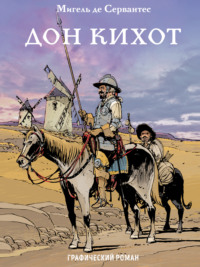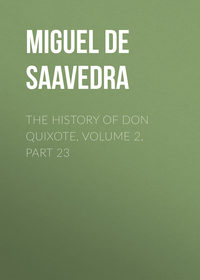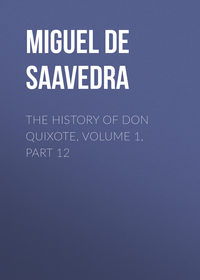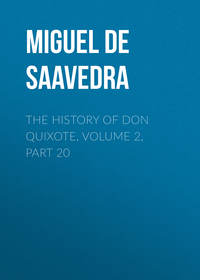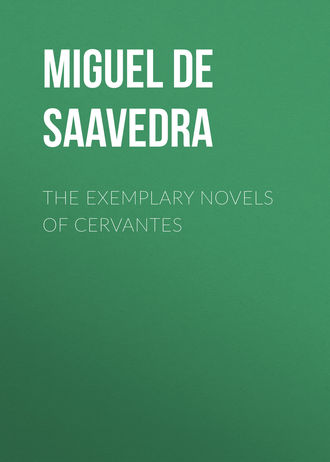 полная версия
полная версияThe Exemplary Novels of Cervantes
Marco Antonio, who had raised himself on one arm while he spoke, now fell back senseless. Don Rafael then came forward. "Recover yourself, dear señor," he said, embracing him affectionately, "and embrace your friend and your brother, since such you desire him to be."
Marco Antonio opened his eyes, and recognising Don Rafael, embraced him with great warmth. "Dear brother and señor," he said, "the extreme joy I feel in seeing you must needs be followed by a proportionate affliction, since, as they say, after gladness comes sorrow; but whatever befals me now I will receive with pleasure in exchange for the happiness of beholding you."
"To make your happiness more complete," replied Don Rafael, "I present to you this jewel as your own." Then, turning to look for his sister, he found her behind the rest of the people in the room, bathed in tears, and divided between joy and grief at what she saw and what she had heard. Taking her by the hand, her brother led her passively to the bed-side, and presented her to Marco Antonio, who embraced her with loving tears.
The rest of those present stared in each others' faces in speechless amazement at these extraordinary occurrences; but the hapless Leocadia, seeing her whom she had mistaken for Don Rafael's brother locked in the arms of him she looked on as her own husband, and all her hopes mocked and ruined, stole out of the room unperceived by the others, whose attention was engrossed by the scene about the bed. She rushed wildly into the street, intending to wander over the world, no matter whither; but she was hardly out of doors before Don Rafael missed her, and, as if he had lost his soul, began to inquire anxiously after her; but nobody could tell what had become of her. He hastened in dismay to the inn where he was told Calvete lodged, thinking she might have gone thither to procure a mule; but, not finding her there, he ran like a madman through the streets, seeking her in every quarter, till the thought struck him that she might have made for the galleys, and he turned in that direction. As he approached the shore he heard some one calling from the land for the boat belonging to the general's galley, and soon recognised the voice as that of the beautiful Leocadia. Hearing his footsteps as he hastened towards her, she drew her sword and stood upon her guard; but perceiving it was Don Rafael, she was vexed and confused at his having found her, especially in so lonely a place; for she was aware, from many indications, that he was far from regarding her with indifference; on the contrary, she would have been delighted to know that Marco Antonio loved her as well. How shall I relate all that Don Rafael now said to Leocadia? I can give but a faint idea of the glowing language in which he poured out his soul.
"Were it my fate, beautiful Leocadia," he said, "along with the favours of fortune to lack also at this moment the courage to disclose to you the secret of my soul, then would there be doomed to perpetual oblivion the most ardent and genuine affection that ever was harboured in a lover's breast. But not to do it that wrong, I will make bold, señora, come of it what may, to beg you will observe, if your wounded feelings allow you, that in nothing has Marco Antonio the advantage of me, except the happiness of being loved by you. My lineage is as good as his, and in fortune he is not much superior to me. As for the gifts of nature, it becomes me not to laud myself, especially if in your eyes those which have fallen to my share are of no esteem. All this I say, adored señora, that you may seize the remedy for your disasters which fortune offers to your hand. You see that Marco Antonio cannot be yours, since Heaven has already made him my sister's; and the same Heaven which has taken him from you is now willing to compensate you with me, who desire no higher bliss in this life than that of being your husband. See how good fortune stands knocking at the door of the evil fortune you have hitherto known. And do not suppose that I shall ever think the worse of you for the boldness you have shown in seeking after Marco Antonio; for from the moment I determine to match myself with you, I am bound to forget all that is past. Well I know that the same power which has constrained me so irresistibly to adore you, has brought you also to your present pass, and therefore there will be no need to seek an excuse where there has been no fault."
Leocadia listened in silence to all Don Rafael said, only from time to time heaving a sigh from the bottom of her heart. Don Rafael ventured to take her hand; she did not withdraw it; and kissing it again and again, he said, "Tell me, lady of my soul, that you will be so wholly, in presence of these starry heavens, this calm listening sea, and these watery sands. Say that yes, which surely behoves your honour as well as my happiness. I repeat to you that I am a gentleman, as you know, and wealthy; that I love you, which you ought to esteem above every other consideration; and that whereas I find you alone, in a garb that derogates much from your honour, far from the home of your parents and your kindred, without any one to aid you at your need, and without the hope of obtaining what you were in quest of, you may return home in your own proper and seemly garb, accompanied by as good a husband as you had chosen for yourself, and be wealthy, happy, esteemed, and even applauded by all who may become acquainted with the events of your story. All this being so, I know not why you hesitate. Say the one word that shall raise me from the depth of wretchedness to the heaven of bliss, and in so doing, you will do what is best for yourself; you will comply with the demands of courtesy and good sense, and show yourself at once grateful and discreet."
"Well," said the doubting Leocadia, at last, "since Heaven has so ordained, and neither I nor any one living can oppose its will, be it as Heaven and you desire, señor. I take the same power to witness with what bashfulness I consent to your wishes, not because I am unconscious of what I gain by complying with them, but because I fear that when I am yours you will regard me with other eyes than those with which hitherto perhaps you have mistakingly beheld me. But be it as it may, to be the lawful wife of Don Rafael de Villavicencio is an honour I cannot lose, and with that alone I shall live contented. But if my conduct after I am your wife give me any claim to your esteem, I will thank Heaven for having brought me through such strange circumstances and such great misfortunes to the happiness of being yours. Give me your hand, Don Rafael, and take mine in exchange; and, as you say, let the witnesses of our mutual engagement be the sky, the sea, the sands, and this silence, interrupted only by my sighs and your entreaties."
So saying, she permitted Don Rafael to embrace her, and taking each other's hand they solemnised their betrothal with a few tears drawn from their eyes by the excess of joy succeeding to their past sorrows. They immediately returned to the knight's house, where their absence had occasioned great anxiety, and where the nuptials of Marco Antonio and Teodosia had already been celebrated by a priest, at the instance of Teodosia, who dreaded lest any untoward chance should rob her of her new-found hopes. The appearance of Don Rafael and Leocadia, and the account given by the former of what had passed between them, augmented the general joy, and the master of the house rejoiced as if they were his own near relations; for it is an innate characteristic of the Catalonian gentry to feel and act as friends towards such strangers as have any need of their services.
The priest, who was still present, desired that Leocadia should change her dress for one appropriate to her sex, and the knight at once supplied both the ladies with handsome apparel from the wardrobe of his wife, who was a lady of the ancient house of the Granolliques, famous in that kingdom. The surgeon was moved by charity to complain that the wounded man talked so much and was not left alone; but it pleased God that Marco Antonio's joy, and the little silence he observed, were the very means of his amendment, so that when they came to dress his wound next day, they found him out of danger, and in a fortnight more he was fit to travel. During the time he kept his bed he had made a vow that if he recovered he would go on a pilgrimage on foot to Santiago de Galicia, and in the fulfilment of that vow he was accompanied by Don Rafael, Leocadia, Teodosia, and even by the muleteer Calvete, unusual as such pious practices are with men of his calling; but he had found Don Rafael so liberal and good-humoured that he would not quit him till he had returned home. The party having to travel on foot as pilgrims, the mules were sent on to Salamanca.
The day fixed for their departure arrived, and equipped in their dalmaticas and with all things requisite, they took leave of their generous and hospitable friend, the knight Don Sancho de Cardona, a man of most illustrious blood and personally famous; and they pledged themselves that they and their descendants, to whom they should bequeath it as a duty, should perpetually preserve the memory of the singular favours received from him, in order that they might not be wanting at least in grateful feeling, if they could not repay them in any other way. Don Sancho embraced them all, and said it was a matter of course with him to render such services or others to all whom he knew or supposed to be Castilian hidalgos. They repeated their embraces twice, and departed with gladness, mingled with some sorrow. Travelling by easy stages to suit the strength of the lady pilgrims, they reached Monserrate in three days, remained as many more there, fulfilling their duties as good Catholic Christians, and resuming their journey, arrived without accident at Santiago, where they accomplished their vows with all possible devotion. They determined not to quit their pilgrim garbs until they reached their homes. After travelling towards them leisurely, they came at last to a rising ground whence Leocadia and Teodosia looked down upon their respective birth-places, nor could they restrain their tears at the glad sight which brought back to their recollection all their past vicissitudes.
From the same spot they discovered a broad valley, which divided the two townships, and in it they saw under the shades of an olive a stalwart knight, mounted on a powerful charger, armed with a strong keen lance and a dazzlingly white shield. Presently they saw issuing from among some olive trees two other knights similarly armed, and of no less gallant appearance. These two rode up to the first, and after remaining awhile together they separated. The first knight and one of the two others set spurs to their horses, and charging each other like mortal enemies, began mutually to deal such vigorous thrusts, and to avoid or parry them with such dexterity, that it was plain they were masters in that exercise. The third knight remained a spectator of the fight without quitting his place. Don Rafael, who could not be content with a distant view of the gallant conflict, hurried down the hill, followed by the other three, and came up close to the two champions just as they had both been slightly wounded. The helmet of one of them had fallen off, and as he turned his face towards Don Rafael, the latter recognised his father, and Marco Antonio knew that the other was his own, whilst Leocadia discovered hers in the third knight who had not fought. Astounded at this spectacle, the two brothers instantly rushed between the champions, crying out "Stop, cavaliers! Stop! We who call on you to do so are your own sons! Father, I am Marco Antonio, for whose sake, as I guess, your honoured life is put to this peril. Allay your anger; cast away your weapons, or turn them against another enemy; for the one before you must henceforth be your brother."
The two knights instantly stopped; and looking round they observed that Don Sancho had dismounted and was embracing his daughter, who briefly narrated to him the occurrences at Barcelona. Don Sancho was proceeding to make peace between the combatants, but there was no need of that, for he found them already dismounted and embracing their sons with tears of joy. There now appeared at the entrance of the valley a great number of armed men on foot and on horseback: these were the vassals of the three knights, who had come to support the cause of their respective lords; but when they saw them embracing the pilgrims they halted, and knew not what to think until Don Sancho briefly recounted to them what he had learned from his daughter. The joy of all was unbounded. Five of the vassals immediately mounted the pilgrims on their own horses, and the whole party set out for the house of Marco Antonio's father, where it was arranged that the two weddings should be celebrated. On the way Don Rafael and Marco Antonio learned that the cause of the quarrel which had been so happily ended was a challenge sent to the father of the latter by the fathers of Teodosia and Leocadia, under the belief that he had been privy to the acts of seduction committed by his son. The two challengers having found him alone would not take any advantage of him, but agreed to fight him one after the other, like brave and generous knights. The combat, nevertheless, must have ended in the death of one or all of them but for the timely arrival of their children, who gave thanks to God for so happy a termination of the dispute.
The day after the arrival of the pilgrims, Marco Antonio's father celebrated the marriages of his son and Teodosia, Don Rafael and Leocadia, with extraordinary magnificence. The two wedded pairs lived long and happily together, leaving an illustrious progeny which still exists in their two towns, which are among the best in Andalusia. Their names, however, we suppress, in deference to the two ladies, whom malicious or prudish tongues might reproach with levity of conduct. But I would beg of all such to forbear their sentence, until they have examined themselves and seen whether they too have not been assailed some time or other by what are called the arrows of Cupid, weapons whose force is truly irresistible. Calvete was made happy with the gift of the mule which Don Rafael had left at Salamanca, and with many other presents; and the poets of the time took occasion to employ their pens in celebrating the beauty and the adventures of the two damsels, as bold as they were virtuous, the heroines of this strange story.
1
There are but twelve of them. Possibly when Cervantes wrote this dedication he intended to include "El Curioso Impertinente," which occurs in chapters xxxiii. – xxxv. of the first part of "Don Quixote."
2
Cardinal Albornoz founded a college in the university of Bologna, expressly for the Spaniards, his countrymen.
3
A gesture of contempt or playfulness, as the case may be, and which consists in a certain twist of the fingers and thumb.
4
The original is benditos, which sometimes means simpleton, but is here equivalent to the Italian beato, and must be rendered as in the text.
5
Albricias: "Largess!" "Give reward for good tidings."
6
The alpargates are a kind of sandal made of cord.
7
Montera, a low cap, without visor or front to shade the eyes.
8
The Monument is a sort of temporary theatre, erected in the churches during Passion Week, and on which the passion of the Saviour is represented.
9
Peter of the Corner; rincon meaning a corner, or obscure nook.
10
The Spanish authorities, under the pretext of being at perpetual war with Infidels, still cause "Bulls of the Crusade," to the possession of which certain indulgences are attached, to be publicly sold in obscure villages. The product of these sales was originally expended on the wars with the Moors, but from the time when Granada fell into the hands of the Spaniards, it has been divided between the church and state. The bulls are carried about by hawkers, who are called "Buleros." —Viardot.
11
An alguazil, who, while in the service of justice, is also in that of the thieves. He betrays them, nevertheless, whenever it suits his purpose to do so:
12
"Clean from dust and straw" —limpios de polvo y paja– is a phrase equivalent to "free of the king's dues."
13
This is a formula used in Spain by those who do a thing for the first time. —Viardot.
14
The Quarto contains four Maravedis.
15
Paulinas are the letters of excommunication despatched by the ecclesiastical courts for the discovery of such things as are supposed to be stolen or maliciously concealed.
16
(This footnote is missing from the printed edition.)
17
Mala Entrada, the evil way.
18
In the slang dialect of Spain, Murcian and Murcia, mean thief, and the land of thieves.
19
In finibus terræ, that is to say, at the gallows, or garotte, which to the thief is the end of the earth and all things.
20
The Patio, familiar to all who have visited Seville, as forming the centre of the houses, and which serves in summer as the general sitting-room, so to speak, of the family.
21
The Braves of the Hampa were a horde of ruffians principally Andalusians; they formed a society ready to commit every species of wrong and violence.
22
The perrillo, or "little dog," was the mark of Julian del Rey, a noted armourer of Toledo, by birth a Morisco.
23
Ganchuelo is the diminutive of gancho, a crimp.
24
Our readers will perceive that this relates to the atrocity committed by the Infant Don Juan of Castille, who, while in revolt against his brother, Sancho IV., appeared before the city of Tarifa with an army, chiefly composed of Mahometans; finding the infant son of the governor, Don Alonzo Perez de Guzman, at nurse in a neighbouring village, he took the child, and bearing him to the foot of the walls, called on Guzman to surrender the place on pain of seeing his infant slaughtered before his eyes in case of refusal. The only reply vouchsafed by Don Alonzo was the horrible one alluded to in the text. He detached his own dagger from its belt, and threw it to Don Juan, when the sanguinary monster, far from respecting the fidelity of his opponent, seized the weapon, and pierced the babe to the heart as he had threatened to do This anecdote is related, with certain variations, in Conde, "La Dominacion de los Arabes en Espana." – See English Translation, vol. iii.
25
The winner.
26
A large purse made of cat-skin.
27
The arroba holds about thirty-two pints.
28
The azumbre is two quarts.
29
A favourite wine, grown on the shore of the Manzanares.
30
The Virgin Martyr, Santa Lucia, had her eyes burnt out of her head, and is regarded, in the Catholic Church, as particularly powerful in the cure of all diseases of the eyes. She is usually represented as bearing her eyes on a salver, which she holds in her hand.
31
The quill-driver.
32
Fat-face, puff-cheeks, or any other term describing fulness of face, in the least complimentary manner.
33
The clamberer.
34
Protector, or more exactly "bully," – to defend and uphold in acts of fraud and violence.
35
Dandy.
36
Sor the contraction of Señor.
37
"Ocaña" is a city at no great distance from Madrid; and if the lady has placed her tiger there, instead of in Hyrcania, as she doubtless intended, it is of course because her emotions had troubled her memory. The "Tarpeian mariner" is a fine phrase surely, but its meaning is not very clear.
38
"At that time," remarks Viardot, "while wounds were still sewed up by the surgeons, the importance or extent of the cut made was estimated by the number of the stitches."
39
Secutor for executor.
40
The goldfinch.
41
The lop-eared, or mutilated; alluding, generally, to losses suffered at the hands of justice.
42
Radomagos, phials or bottles of ink, vitriol, and other injurious matters, cast on the face, person, or clothes.
43
Most of our readers will remember that the "sanbenito" is the long coat or robe, painted over with flames, which is worn by heretics whom the Inquisition has condemned and given over to the civil power.
44
Calomels, for calumnies
45
The flat-nose.
46
The tilde is the mark placed over the Spanish letter n, as in Señor.
47
Tricks of cheatery at cards.
48
Cutpurse.
49
The wolf-cub.
50
For Peruvians, which the American merchants were then called.
51
Don Augustin de Arrieta, a Spanish commentator of our author, informs us that the camarada not only journeyed and lived with his companion of the way, but even slept in the same chamber, and not unfrequently in the same bed.
52
The ex-votos, or pictures and figures here described, are too familiar to the visitor of Catholic churches to need any explanation.
53
Student: they are so called from the name given to the portfolio in which they carry their books and papers to the university, and which they always have with them.
54
The reader will be pleased to guess the name of that insufferable insect which the Spaniards denominate Chinche, and with the English equivalent of which I am unwilling to offend his eyes. Happy, indeed, if he cannot guess; but then he cannot have seen either Seville or Granada, and one might almost encounter an acquaintance with the animal called Chinche rather than renounce them.
55
Such of our readers as have visited Rome, will remember that enormous mound which is seen rising on the right hand as you leave the city, by the Porta Salaria, and is said to have been formed by the numberless fragments of pottery cast on the spot from time immemorial.
56
Master.
57
Here Rodaja spoke mockingly, an impure Portuguese, and not Spanish (olhay, homen, naon, digais, teno, sino tino). The spirit of the remark (as in some other passages omitted for that reason) consists in a play on words resembling each other in sound, though not in sense, and is necessarily lost in translation.
58
Alferez, Ensign.
59
A common form of invitation, meaning we will partake of a poor repast.
60
When Cervantes wrote this, a decree had recently been issued limiting the length of the sword.
61
An old promenade of the city.
62


